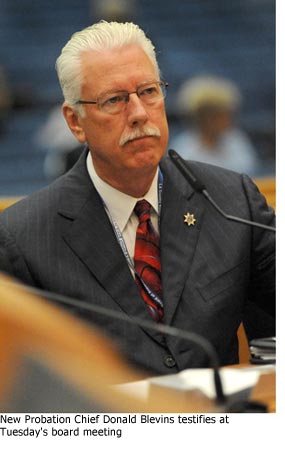Supervisors back probation reforms
June 29, 2010
 Standing along a back wall in the Board of Supervisors’ hearing room, the newly appointed chief of the Probation Department almost smiled as his bosses unanimously passed three measures aimed at restoring integrity and accountability to the troubled agency.
Standing along a back wall in the Board of Supervisors’ hearing room, the newly appointed chief of the Probation Department almost smiled as his bosses unanimously passed three measures aimed at restoring integrity and accountability to the troubled agency.
“I thought the vote was very encouraging,” said Chief Probation Officer Donald Blevins, who has little to smile about these days. “This is another example of the message I continue to get from [the Supervisors]—that we brought you in to fix a huge problem and we want to give you the tools to get the job done.”
The motions, which passed quickly and without discussion, had been tabled after Supervisor Mark Ridley-Thomas abstained from voting on them last week, leaving the short-handed board one vote short of the three needed for passage. Although the supervisor did not explain the move, the next day he called on the Justice Department to broadly oversee the Probation Department, saying the problems were too entrenched for the new management team to fix—a view not shared by his colleagues.
On Tuesday, Ridley-Thomas voted to approve the three motions. Supervisor Don Knabe was absent.
In recent weeks, the 6,000-person Probation Department has been rocked by disclosures that, among other things, employees used county credit cards to buy electronics goods that dozens of employees accused of misconduct escaped discipline because the investigations ran too long and that the department cannot fully track $79 million allocated by the Board of Supervisors largely to hire personnel.
Two of the motions passed Tuesday were co-authored by Supervisor Zev Yaroslavsky. One, written with Supervisor Michael D. Antonovich, will expand the responsibilities of the Office of Independent Review to include oversight of the Probation Department’s internal investigations. For nearly a decade, the OIR’s work has been largely confined to monitoring the operations of the Sheriff’s Department.
The second motion—this one co-authored with Supervisor Gloria Molina—directs the CEO, County Counsel, personnel officials and others to explore within 30 days how Blevins could, under Civil Service rules, begin hiring more managers from outside the Probation Department—a break with current practices.
The third motion, authored by Supervisors Antonovich and Knabe, attempts, among other things, to insure that that no employees in the future escape discipline because of unnecessarily long internal investigations and that probation officials responsible for such lapses in the past be held accountable.
In an interview, Blevins said that, thanks to the passage of the motions, he was “pretty satisfied that we have the right tools we need now.” He didn’t rule out, however, the possibility that he’ll return to the Board for help in solving future problems.
Moving forward, Blevins stressed the need for building a management team of about four to eight people, including insiders and outsiders, that can hit the ground within 60 days. “It’s important,” he said, “to have a management team that’s loyal to you.”
He said he also wants to quickly initiate discussions with the Office of Independent Review so its attorneys can start providing the kind of tough oversight that will reduce bottlenecks that have plagued the department’s internal disciplinary system. He praised a recently completed OIR study of the department’s disciplinary lapses, saying it offered “the same conclusions I would have come to.”
On Tuesday, Blevins also presented the supervisors with a status report on the management and administration of the department, focusing on areas where the department already has begun to confront deficiencies and impose tighter controls.
Blevins said, for example, that the department is now attempting to track where each of its employees currently is assigned to work. This surfaced as an embarrassing problem after probation officials were unable to tell the board exactly how the $79 million allocated for new hires had been spent.
Blevins also said in his report he is determined to increase the department’s operational and financial efficiency by making sure staffing ratios are appropriate and that the department’s network of juvenile camps are not housing charges who would benefit from less costly community-based alternatives.
Still, despite the many problems facing his department, the well-respected probation chief sounded a positive note.
“Although there are departmental practices and procedures which have developed over many years and are within a departmental culture that is by nature resistant to change,” he said, “such resistance can be overcome as many staff and managers appear to be supportive of change to improve the Department.”
Two additional reports are scheduled to be delivered to the Board of Supervisors next month. One is an assessment undertaken by Chief Deputy Cal Remington and the other is a report by county-hired consultants on the juvenile probation camps.
Posted 6/29/10












 405 bridge work causes a stink
405 bridge work causes a stink
